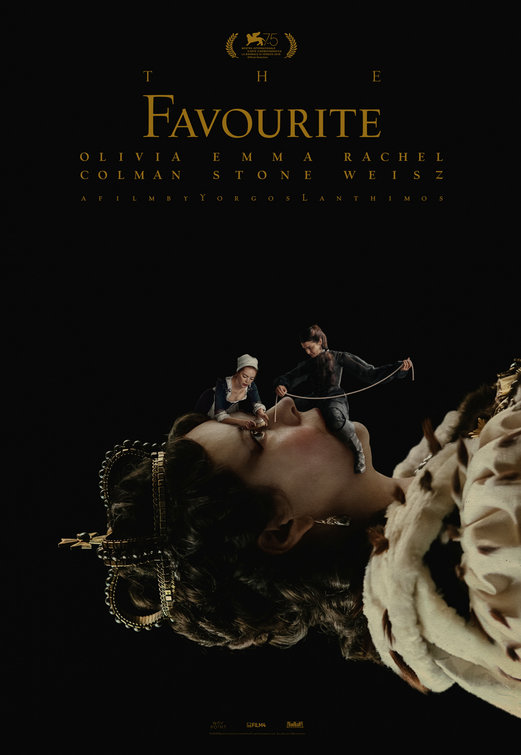Long Live The Queen
Director
Yorgos Lanthimos
Starring
Olivia Colman
Rachel Weisz
Emma Stone
Set in the early seventeen hundreds – a rarely explored period of British history – we are introduced to Queen Anne [Colman] and her advisor Sarah Churchill, the Duchess of Marlborough [Weisz]. Through the early interactions it is clear that Anne has little interest or even capacity to rule the country and daily matters of state are pushed through by Marlborough. As England is at war with France (the fourteen year War of the Spanish Succession) Marlborough pushes for the war effort to be doubled and taxes to be raised, infuriating half of parliament. Politicians are unable to work past Marlborough to get to the Queen until Abigail Hill [Stone] is taken on as a scullery maid. It is revealed that Abigail is Marlborough’s cousin but due to her father’s gambling and drinking, has long lost her title. After surreptitiously treating the Queen’s gout, Abigail earns the Queen’s favour and is elevated to lady-in-waiting. As the story continues, it becomes apparent that Abigail means to further work her way into the Queen’s graces and ultimately supplant Marlborough.
It would be wrong to call this a comedy. Despite the marketing campaign, the level of sadism and spite that supersedes the initially pitched straight comedy will ostracise many cinemagoers. This is, of course, far from a negative point, as pandering to audiences should rarely be an artist’s priority. Ultimately, I can’t say I’m that surprised, considering Lanthimos’ previous works but in truth, this release is significantly more approachable, subduing the more outlandish elements and favouring a fairly straightforward look at hedonism, entitlement and absurdity. It is presented, however, with a specific visual flare, combining lavish production design and settings with the occasional fish-eye lens and ever-low, snaking camera movements, as if the viewer is a mere unseen underling, passing unseen through these private chambers. Equally, the score can be quite maddening, ranging from typical period-appropriate classical pieces to almost horror score stings and stabs.
While the beautiful visuals and haunting aural work is on top form, the film mostly shines thanks to the three lead performances. Olivia Colman has been portraying deep, emotional roles on British television and cinema screens for several years but will no doubt rise to prominence for her role here once paired with her upcoming work on The Crown .Colman’s portrayal of mental health, infirmity and decrepitude is both realistic and unflattering. There is always the constant danger, when portraying mental health on screen, of veering into excess and extravagance (admittedly, sometimes the role calls for it) but Queen Anne feels grounded and plausible with erratic mood swings, bouts of manic urgency and fatigue. Weisz and her delivery are extremely curious. Her role as Anne’s confidante is delivered with a similar childlike speed, confidence and naivety that was on display in The Lobster but in a way this serves to assist in normalising Anne’s eccentricities by highlighting the insanity of life at court. It’s also extremely difficult, when discussing Stone’s character, to avoid comparisons between The Favourite and All About Eve. But Stone reminds us of why she is a genuinely interesting talent, offering a complex, paranoid performance of a woman who sees loyalty as a thing to be manipulated rather than earned. But this only illustrates the best element of this story, which is that none of these characters are truly innocent and all are guilty of manipulating the other for various forms of personal gain.
The Favourite is, however, not without its flaws. There will be critics who will fawn over its lavish nonsense and viewers who will dismiss it for the exact same reason. In truth, while it is extremely well executed, this film lacks a few components or developments that could have really created a fantastic piece from start to end. Things like Marlborough’s motives pushing so heavily for war. A great deal is implied in terms of theft but due to the semi-unreliable nature of the characters it’s difficult to tell whether this is real or a fabrication of Abigail’s – even if the latter is most likely. There’s also a lack of historical context and absence of life outside the palace. While this replicates the hermetic environment the Queen inhabits, it adds a great deal of unknown for the audience and a lot of the satirical nods are lost. I’m not saying the movie should adhere to complete historical accuracy but the chance to analyse an incompetent ruler surrounded by sycophants and conspirators while drawing a subtle contemporary comparison would have been greatly appreciated. On top of that, everything unfolds very neatly and due to the nature of the performances, a lot of the tension is lost.
Overall, The Favourite is a very fun and ridiculous feature that often ventures into the cruel and brutal but for all its bells and whistles, it just misses out on being something truly special.
Release Date:
1st January 2019
The Scene To Look Out For:
To offset the Queen’s temper, Abigail discusses the ornate hutches in the monarch’s chambers. Anne explains that each rabbit is named after a child that she lost, whether stillborn or miscarriage. It’s a simple sobering moment amidst the senselessness and one that highlights the depths of Colman and Stone’s performances respectively.
Notable Characters:
While the three leads carry this film, the other key standout performance is Nicholas Hoult’s brilliantly awful representation of the leader of the opposing Whig Party, Robert Harley, the first Earl of Oxford. Uncaring, unfeeling, opportunistic, arrogant and pressing his own agenda, Hoult is one of the more comedic performances and even in his malice is laughably silly and extremely well-performed.
Highlighted Quote:
“It’s my state. Am I not business of state?”
In A Few Words:
“A more restrained effort from Lanthimos but a fantastic, twisted release all the same”
Total Score: 4/5
![The Red Right Hand Movie Reviews [Matthew Stogdon]](https://reviews.theredrighthand.co.uk/wp-content/uploads/2021/12/cropped-header1.png)




